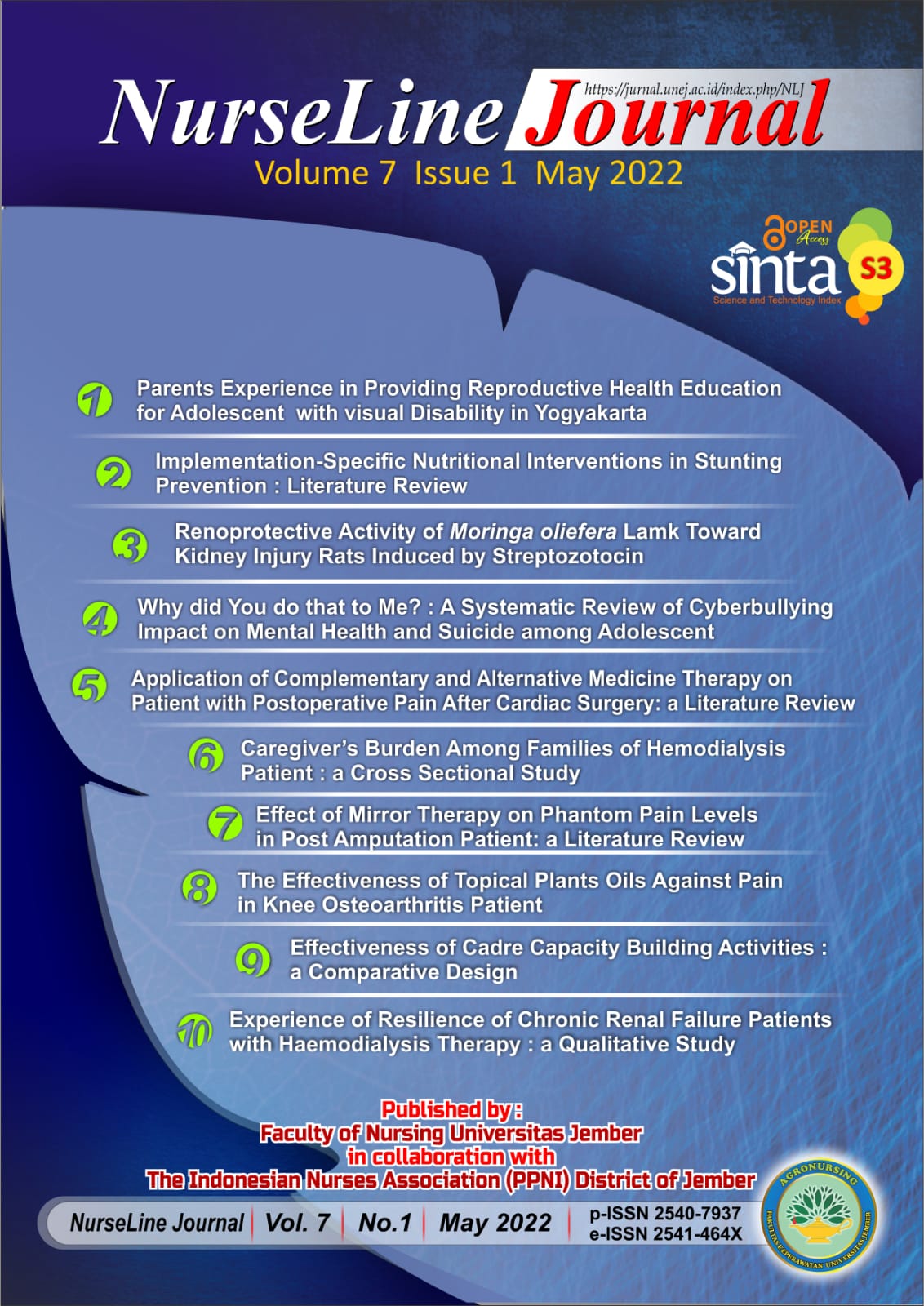Parents Experience in Providing Reproductive Health Education for Adolescent with Visual Disability in Yogyakarta
DOI:
https://doi.org/10.19184/nlj.v7i1.23603Keywords:
reproductive health education, visual disability, adolescent, parentAbstract
Background: Visibility impairment in children with visual disabilities affect their cognitive experiences, reproductive health problems and sexual abuse. One way to prevent negative experiences related to reproductive health and sexuality is to reproductive health education by parents as the closest person to the child. The purpose of this research is to get an idea how parent experience in providing reproductive health education to adolescents with visual disabilities in Yogyakarta. Method: This research is a qualitative research with phenomenology approach. The study was conducted from July to August 2017 in three schools, which are: SLB Negeri I Bantul, SLB Yaketunis and MTs LB Yaketunis Yogyakarta. Participans were selected by purposive sampling based on inclusion and exclusion criterion, and considered the maximum variation sampling. The participants were 10 visual disability parents (father and/or mother). The data was collected through interviews using semi-structured interview guidelines. Data were analyzed using Colaizzi method. Result of the research: Five themes are: 1) Reproductive health education is provided in accordance with the needs of children; 2) The parents have barriers in giving reproductive health education; 3) Reproductive health education in adolescent with visual disability is given by optimizing the sense of listening, touching and kissing 4) Religion and social norms become the basis of parent’s consideration in providing reproductive health education; 5) The visual disability conditions experience by parents will affect the education provided Conclusion: Reproductive health education is important since early age in adolescents with visual disability, by considering media and appropriate methode that is by optimizing the function of the sense of hearing, touch and smell.
Downloads
References
Wilson, E.K, Dalbert, B.T, Koo, H.P and Gard, J.C (2010). Parents’ Perspective on Talking to Preteenage Children About Sex. Perspective on Sexual and Reproductive Health. 42(1); 56-63, doi: 10.1363/4205610.
Andika, A (2010). Ibu Dari Mana Aku Lahir? Cara Cerdas Mendidik anak Tentang Seks. Pustaka Grhatama; Yogyakarta.
Santrock, JW (2011). Masa Perkembangan Anak Edisi 11 Buku 2. Jakarta: Salemba Humanika
Nugroho, S & Utami, R (2004). Meretas Siklus Kecacatan Siklus Yang terabaikan. Surakarta: Yayasan Talenta.
Groce, N and Peaglow, C (2005). Thematic Group on Violence Againts Disabled Children. Violence Againts Disabled Children. UN Secretary Generals Report on Violence Against Children. Summary report. Connecticut: Yale School of Public Health.
Ammermard, R.T, Hersen, M, Van Hasselt, V.B, Lubetsky, M.J, Sieck, W.R (1994). Maltreatment in Psychiatrically Hospitalized Children and Adolescents With Developmental Disabilities: Prevalence and Correlates. J am Acad Adolesc Psychiatry, 33: 567-76.
Mall, S & Swartz, L (2012). Sexuality, Disabilityand Human Rights: Strengthening Healthcare for Disabled People. S Afr Med J 2012:102(10):792-793, DOI:10.7196/SAMJ.6052.
Hidayat, A.A.S & Suwandi, A (2013) Pendidikan Anak Berkebutuhan Khusus Tunanetra. Luxima Metro Media: Jakarta
Manu, A.A, Mba, C.J, Asare, G.Q, Odoi-Agyarko, K, Asante, R.K.O (2015). Parent-Child Communication About Sexual and Reproductive Health: Evidence From the Brong Ahafo Region, Ghana. Reproductive Health 2015, 12:16. DOI 10.1186/s12978-015-0003-1.
Ariadni, D,K (2016). Pengalaman Orangtua dalam Memberikan Pendidikan Seks Pada Anak Disabilitas Intelektual: Studi fenomenologi di Yogyakarta. Fakultas Kedokteran Universitas Gadjah Mada, Yogyakarta.
Irianto, K (2014), Seksologi Kesehatan. Alfabeta: Bandung
Emelumadu, O.F, Ezeama, N.N, Ifeadike, C.O, Ubujaka, C.F, Adogu, P.O.U, Umeh, U, Nwamoh, U.N, Ukegbu, A.U, Onyeonoro, U.U (2014). Parents Perceptions of Timing of Initiation of Sexuality Discussion with Adolescents in Anambra State, South eastern Nigeria. Journal Pediatry Adolescent Gynecology 27 (2014): 294-300.
Pilot, D.F & Beck, C.T (2010). Essentials of Nursing Research: Appraising Evidence for Nursing Practice. Lippincott Williams & Wilkins: Philadelphia
Muhwezi, W.W, Katahoire, A.R, Banura, C, Mugooda, H, Kwesiga, D, Bastein, S, Klep, K.I (2015). Perceptions and Experiences of Adolescents, Parents, and School Administrators Regarding Adolescent-parent Communication on Sexual and reproductive health Issues in Urban and rural Uganda. Reproductive Health, 12:110. DOI 10.1186/s12978-015-0099-3.
Kamangu, A, John, M.R, & Nyakoki, S (2017). Barriers to parent-child communication on sexual and reproductive health issues in East Africa: A review of Qualitative research in four countries. Journal of African Studies ang Development. Doi. 10.5897./JASD2016.0416
Motsomi, K, Makanjee, C, Basera, T & Nyasulu, P (2016). Factors Affecting Effective Communication about Sexual and Reproductive Health Issues between parents and adolescents in Zandaspruit Informal Settlement, Johannesburg, South Africa.25:120.Doi 10.11604/pamj.2016.25.120.9208.








